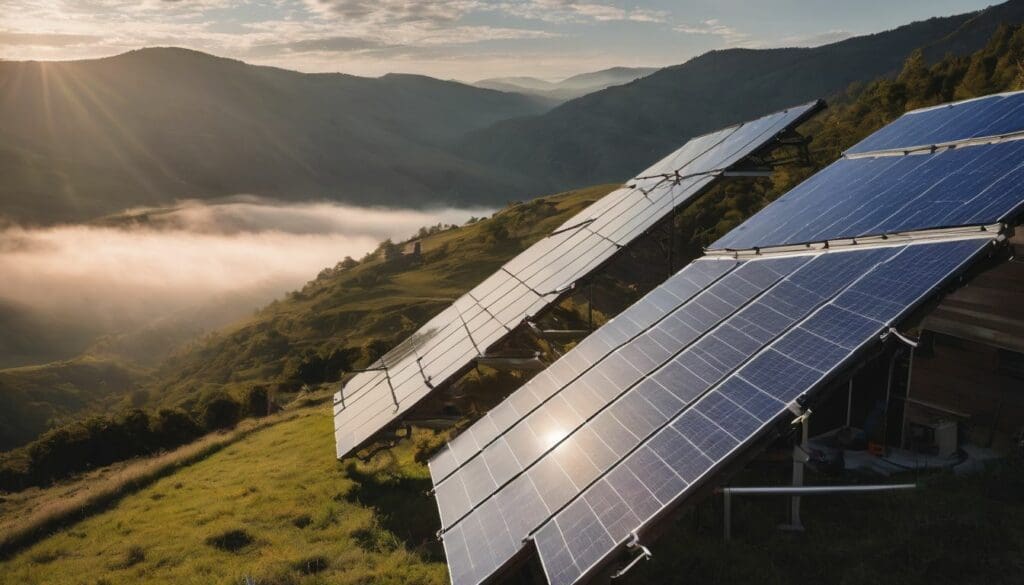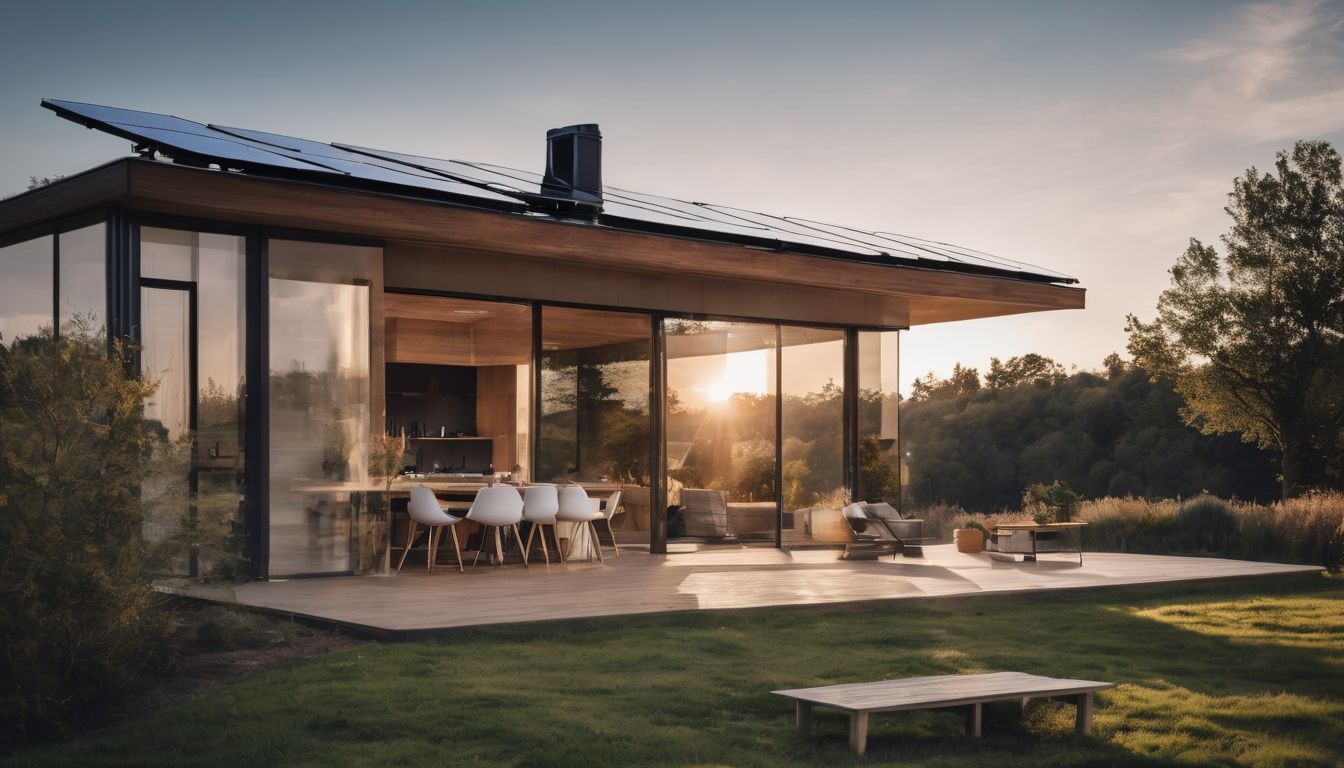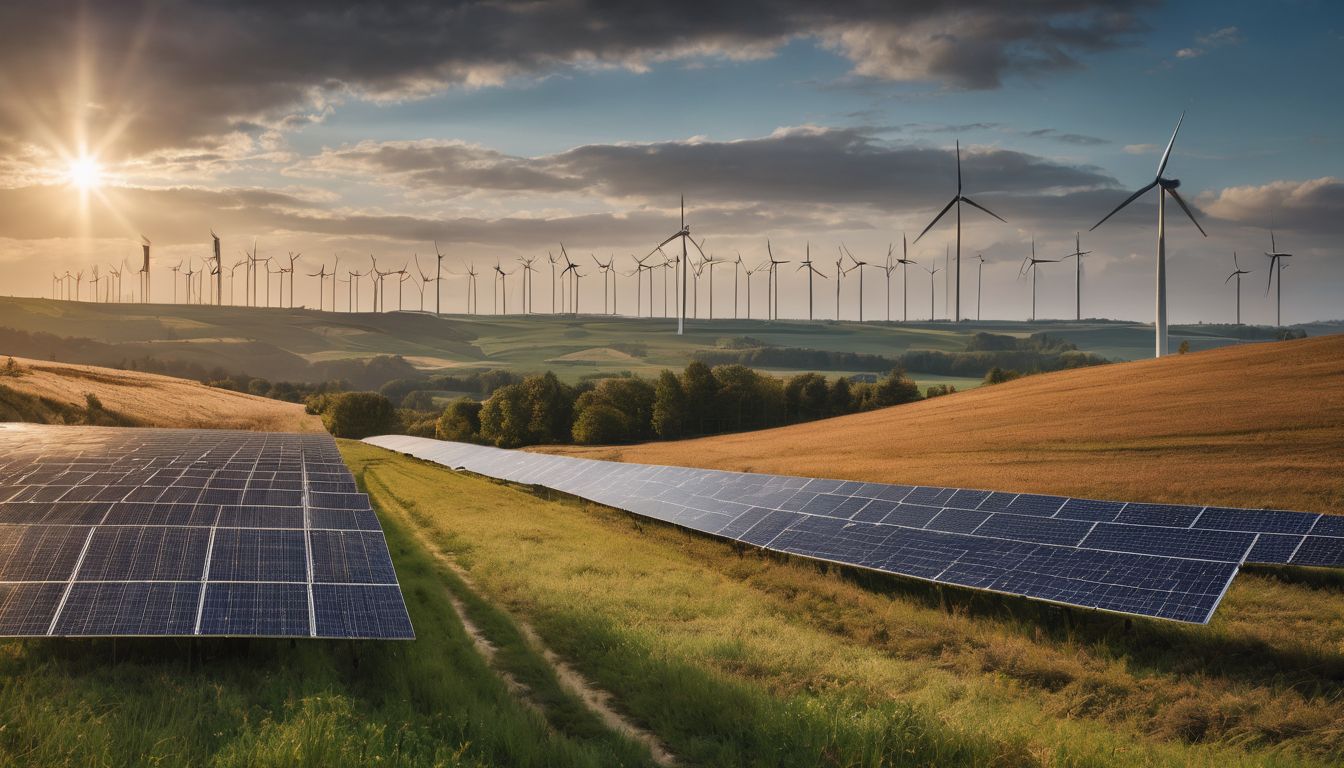Energy access in rural areas can be a real struggle, with many communities cut off from the convenience of modern power grids. Around 789 million people globally live without electricity, most residing in remote rural locations.
This article will explore innovative and sustainable solutions to light up these areas without harming our planet. Dive into a world where energy meets ingenuity!
Key Takeaways
- Solar microgrids, biomass conversion, and small – scale hydropower provide reliable and clean energy to remote rural communities, helping reduce reliance on polluting fuels.
- Innovative use of IoT technology in energy management allows for more efficient resource use and better communication between communities and service providers.
- Real – life examples like the Solar Village Project illustrate how sustainable energy solutions are successfully transforming lives in rural areas by improving access to electricity.
- Community engagement and education are crucial for the successful implementation of renewable energy projects, ensuring local residents understand benefits and contribute to sustainability efforts.
- Clean cooking solutions introduced alongside off – grid renewables significantly improve health outcomes by reducing harmful indoor air pollution.
Challenges of Energy Access in Rural Communities
Rural communities often face limited or no access to traditional grid systems, forcing them to rely on polluting energy sources. This creates a barrier to economic development and negatively impacts the environment and public health.
Limited or no access to traditional grid systems
Many rural communities face the reality of being cut off from traditional grid systems, a challenge that hampers their growth and quality of life. The lack of infrastructure makes it difficult to tap into the constant flow of energy that urban areas often take for granted.
These remote areas frequently struggle with unreliable power supplies or are left without any electricity at all, forcing residents to depend on expensive and environmentally harmful alternatives like diesel generators.
The solution lies in sustainable energy solutions that can operate independently from larger grids. Innovative off-grid renewables such as solar panels, wind turbines, and small-scale hydropower stations offer rays of hope for these underserved regions.
They provide a means for rural electrification while also alleviating some of the environmental impacts associated with traditional energy sources. Transitioning to these decentralised systems could transform lives by lighting up homes, powering businesses, and fuelling community development—without waiting for extensive grid expansion projects that may never come.
Next comes exploring how harnessing nature’s flow is revolutionising sustainable energy in isolated locations.
Dependence on polluting energy sources
Rural communities often rely on polluting energy sources such as kerosene, diesel, and wood for their energy needs. These sources not only contribute to environmental degradation but also pose health risks for the residents due to indoor air pollution.
The burning of these fuels releases harmful emissions, leading to respiratory diseases and other health issues in these areas.
The dependence on such polluting energy sources is detrimental both environmentally and socially. Transitioning towards sustainable energy solutions is crucial for mitigating these adverse effects while ensuring a healthier and cleaner environment for rural communities.
Renewable energy alternatives offer an opportunity to reduce reliance on polluting sources, providing clean and efficient power without compromising the well-being of the inhabitants.
Harnessing Nature’s Flow for Sustainable Energy
Harnessing nature’s flow for sustainable energy is crucial in rural areas, where traditional grid systems may be limited or non-existent. Solutions such as solar microgrids, biomass conversion, and small-scale hydropower can provide clean and reliable energy to these communities.
Solar microgrids
Solar microgrids provide a sustainable energy solution for rural communities, utilising solar power to generate electricity independently of the traditional grid system. These small-scale power grids are versatile and can be tailored to suit the specific energy needs of remote areas, reducing reliance on polluting sources.
By integrating solar microgrids into rural communities, clean energy becomes more accessible and affordable, contributing to sustainable development while minimising environmental impact.
These microgrid systems offer reliable and consistent energy access without the need for extensive infrastructure or ongoing fuel costs. Through community-based energy solutions like solar microgrids, rural areas can enjoy improved living standards and economic opportunities while promoting renewable energy sources such as solar power.
Biomass conversion
Moving on from solar microgrids, another sustainable energy solution in rural areas is biomass conversion. This process involves converting organic materials such as agricultural waste, wood chips, and plant residue into bioenergy for heating, cooking, and electricity generation.
Biomass conversion technologies include anaerobic digestion, gasification, and combustion processes that efficiently harness the energy stored in organic matter to provide a reliable and renewable source of power for off-grid communities.
These innovative methods not only help reduce reliance on polluting energy sources but also contribute to addressing waste management challenges in rural areas by repurposing agricultural residues and organic waste for clean energy production.
Small-scale hydropower
Transitioning from the conversion of biomass to energy, small-scale hydropower offers another sustainable solution for rural areas. Harnessing the natural flow of rivers and streams, small-scale hydropower systems generate electricity by directing water through turbines.
This renewable energy source provides a consistent and reliable power supply for off-grid communities, reducing their reliance on polluting fossil fuels.
Small-scale hydropower projects are environmentally friendly and have minimal impact on local ecosystems. By utilising this clean energy source, rural communities can improve their energy access while reducing their carbon footprint.
Smart Solutions for Enhanced Energy Efficiency
Harnessing the latest technology, off-grid solutions and mini-grids are providing rural communities with clean cooking solutions and enhanced energy efficiency. These smart energy solutions are improving access to reliable and sustainable energy in remote areas.
Off-grid solutions
Off-grid solutions provide sustainable energy options for rural communities. These solutions include solar microgrids, biomass conversion, and small-scale hydropower. Implementing off-grid renewable energy solutions can reduce dependence on polluting energy sources and improve energy access in remote areas.
Smart energy solutions like mini-grids and clean cooking technologies further enhance the efficiency of off-grid systems. By embracing these off-grid alternatives, rural communities can benefit from improved energy access while reducing their environmental impact.
This paves the way for a more sustainable future for both the environment and local communities.
Mini-grids
Transitioning from off-grid solutions, mini-grids are a promising approach to providing reliable energy access in rural areas. These small-scale power grids can connect multiple households and businesses to a localised distribution network.
By integrating renewable energy sources such as solar or wind power, mini-grids offer a sustainable solution for communities that are underserved by traditional grid systems. Additionally, these self-contained networks contribute to enhancing the overall energy resilience of rural settlements.
Clean cooking solutions
Clean cooking solutions are vital in rural areas, where traditional cooking methods often involve the use of solid fuels. Transitioning to clean and efficient cookstoves not only reduces indoor air pollution but also minimises the environmental impact.
Off-grid renewable energy solutions play a significant role in providing access to clean cooking technologies, offering alternatives such as biogas, solar cookers, and improved biomass stoves.
These sustainable options contribute to healthier living environments while promoting conservation efforts.
Empowering rural communities with clean cooking solutions aligns with broader goals of sustainable energy development for rural areas. Integrated approaches that incorporate off-grid renewables can significantly improve the overall well-being of these communities by addressing health concerns and reducing reliance on traditional polluting sources.
Communication Integration for Seamless Energy Solutions
– Bridging the communication gap in rural areas through innovative technology and IoT for energy management. Discover how these solutions are transforming rural communities!
Bridging the communication gap in rural areas
To ensure seamless access to sustainable energy solutions in rural areas, bridging the communication gap is vital. This involves not only improving physical infrastructure but also leveraging digital technologies to connect remote communities with energy providers and resources.
By integrating IoT for energy management, communities can monitor and control their energy usage more effectively, leading to enhanced efficiency and reduced waste.
Moreover, successful real-life examples demonstrate how communication integration has empowered rural areas with reliable and clean energy options. Leveraging modern communication tools enables these communities to stay informed about maintenance schedules, manage billing systems, and access support when needed.
Leveraging IoT for energy management
IoT, or the Internet of Things, plays a crucial role in energy management for rural areas. By connecting smart devices and sensors to a central system, IoT enables real-time monitoring and control of energy usage.
This allows for efficient allocation of resources and identification of potential issues before they escalate into significant problems. Through IoT, off-grid renewable energy solutions such as solar microgrids and small-scale hydropower can be optimised for better performance and reliability.
Additionally, IoT integration facilitates seamless communication between different components of the energy system, ensuring that rural communities have access to reliable and sustainable energy sources.
Furthermore, leveraging IoT empowers rural communities by providing them with valuable insights into their energy consumption patterns. This helps residents make informed decisions about their usage habits and encourages more responsible energy management practices.
Real-life examples of successful integration
Leveraging IoT for energy management can transform rural areas, as seen in the success of the Solar Village Project. By utilising smart meters and sensors, this project optimises energy distribution and consumption in remote communities, providing efficient off-grid renewable energy solutions.
Additionally, community-based initiatives such as the Grameen Shakti programme have empowered local residents to install sustainable energy technologies like solar home systems, enabling them to become actively involved in managing their own energy resources.
Furthermore, the introduction of mini-grids by organisations like Husk Power Systems has demonstrated the potential of small-scale hydropower to bring about tangible improvements in energy access.
Empowering Rural Communities with Sustainable Energy
Renewable energy brings various benefits to rural communities, including economic growth and improved living conditions. Real-life success stories show the positive impact of community engagement and education in promoting sustainable energy solutions.
Benefits of renewable energy for rural communities
Renewable energy offers numerous benefits for rural communities, including increased energy access and reliability. By harnessing off-grid renewables such as solar microgrids and small-scale hydropower, rural areas can become less dependent on traditional grid systems and polluting energy sources.
This independence provides a more sustainable and environmentally friendly solution to meet the energy needs of these communities, leading to a significant reduction in air pollution and greenhouse gas emissions.
Furthermore, community-based renewable energy solutions empower rural inhabitants by creating local job opportunities, reducing electricity costs, and improving overall quality of life.
Real-life success stories
In a village in rural India, solar microgrids have transformed daily life. Families now have access to clean and reliable energy for lighting, cooking, and powering appliances without relying on polluting sources.
- Solar microgrids provide electricity to remote villages, enabling children to study at night and adults to work after dark.
- Biomass conversion has given communities in sub – Saharan Africa a cleaner alternative for cooking and heating, reducing indoor air pollution and its related health impacts.
- Small – scale hydropower projects in Southeast Asia have empowered villages with sustainable energy, driving economic development and improving living standards.
The role of community engagement and education
Real-life success stories have shown that community engagement and education play a pivotal role in the successful adoption of sustainable energy solutions in rural areas. By actively involving local communities in decision-making processes and providing them with relevant education, the acceptance and utilisation of off-grid renewable energy solutions can be significantly enhanced.
Empowering individuals to understand the benefits of small-scale hydropower, off-grid renewables, and clean cooking solutions fosters a sense of ownership and responsibility within the community.
Through community-based energy solutions, residents can become advocates for sustainable practices, driving further positive change within their locality. Education about off-grid energy not only improves living conditions but also has a direct impact on environmental conservation efforts.
Conclusion
Rural communities benefit from sustainable energy solutions. Through solar microgrids and small-scale hydropower, off-grid renewable energy is made accessible. By integrating IoT for efficient management, rural areas can enhance energy usage.
Empowering communities with sustainable energy leads to brighter futures and a healthier planet.
FAQs
1. What are sustainable energy solutions for rural areas?
Sustainable energy solutions for rural areas include off-grid renewables like small-scale hydropower and community-based energy options that provide clean power away from main grids.
2. How do off-grid solutions help rural communities?
Off-grid solutions allow people living in remote locations to access reliable, renewable energy sources, improving their quality of life and reducing reliance on fossil fuels.
3. Can small-scale hydropower be used in any rural area?
Small-scale hydropower is ideal for rural regions with suitable water resources; it generates electricity locally without the need for large infrastructure.
4. Why are community-based energy solutions important?
Community-based energy solutions ensure that even the most secluded villages can benefit from sustainable power, fostering independence and resilience within these communities.





